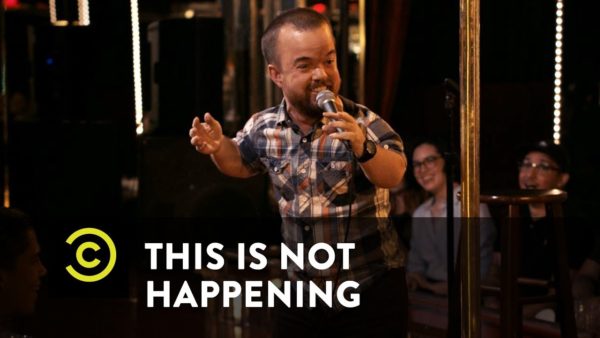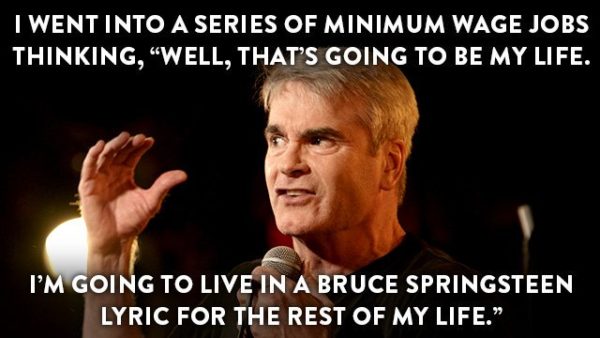Television Review: “This is Not Happening” — Standup Comedy Gets Real
By Matt Hanson
This Is Not Happening serves up welcome shots of honestly and reality that hit you in the most ticklish parts of your own amusingly flawed, hilariously stupid humanity.

A few years ago, the novelist and professor David Shields wrote a controversial book called Reality Hunger that threw a monkey wrench into the ways that we are accustomed to reading. I’m paraphrasing, but his essential argument boils down to this: the artifice of fiction has become an annoying and unnecessary buffer between the reader and the text’s emotional content. Instead, he proposes that literary experience’s real deal is found in the immediacy of diaries, such as the soul-scouring memoirs of John Cheever, where the distance between the reader and the writer’s consciousness is minimal. We can bask in all the furious complexity of the psyche — only after we have rejected the artificial constructions of fiction.
It’s provocative idea, though I have my doubts. Still, Shields might be onto something if we apply this deconstructive approach to storytelling that (technically) isn’t literature at all. Stand-up comedy is enjoying a cultural renaissance these days for many reasons — it’s cheap to produce and distribute, easy to consume, and the laughs it promises audiences go down a lot easier than a bleak piece of fiction or poetry. Ironically, today’s cutting-edge standup comedy is deep into reality hunger.
Instead of the hoary, predictable setup/punchline set-up of a Bob Hope or Henny Youngman (“My wife said she wanted to go somewhere she’s never been before. I said, try the kitchen!”), comics now are turning to mining their own biographies for humor and insight. I pointed this out a while back in an Arts Fuse piece about Neil Brennan’s innovative 3 Mics special; the Tasmanian comic Hannah Gadsby had a huge, unexpected breakthrough with her special Nanette, where she takes the tangled (and often dire) circumstances of her life as a lesbian woman in a provincial town out of the realm of farce and into something more confrontational. By speaking her truth, she exposes the easy lie of jerry-rigging the audience’s reaction. The comedy series that may well be doing the most to explore this variety of confessional comedy is Comedy Central’s series This Is Not Happening, which has recently wrapped up its fourth series.
The show’s premise, as explained by the original host Ari Shaffir, is very simple — just funny people telling true stories of the craziest, most disturbing, heartbreaking, and often hilarious things that have ever happened to them. There are times when you can tell that the people sharing the stories — mostly comics but a few actors or musicians added to the mix- –are clearly accentuating certain insights or jokes within the narratives. Comedians are expert storytellers, after all, but the fact that these stories also contain the brutal ring of truth cancels out the fact that they might have been told a few times before.
One of my favorite examples is Brandt Tobler’s “The Time I Tried to Kill My Dad.” It’s received over two million views on YouTube since it was released a year ago. Tobler’s father was a lifelong jailbird who only became a presence in his life when Tobler was barely in his teens. The father and son reunion started heartwarmingly enough — as innocent as booze-fueled storytelling sessions conducted late at night in Vegas can possibly be — but quickly take an alarming turn. I believe Tobler completely because, even though he is ultimately there to get laughs, he is so resignedly casual about the plain facts of his profoundly messed-up relationship with his father that when he hits the quasi-punchline “blood is thicker than water” (one of his dad’s constant refrains) it’s hilarious because of all the dramatic tension he’s spent the past fifteen minutes building into the story. Here, take a look for yourself:
Not surprisingly, some of the narratives take some abrupt turns into very dark territory. Ali Siddiq tells, with disarming amiability, not one but two stories of surviving in prison: one yarn involves having to deal with the Kafkaesque bureaucracy of obtaining a much-needed prison shank on the black market; the other speaks volumes about the psychological power games that prison guards play with inmates. Both of these narratives have several million views. Byron Bowers’ “The Day I Found Out” also talks about his awkward relationship with his father and the forces that drove them apart. Near-death experiences come in all varieties as well; they can be the speaker’s fault, an unexpected health problem, or the result of a lifestyle gone deeply awry.
Drugs play a pretty big role in these tales. Interestingly, the stories detailing the most wildly inappropriate levels of intoxication go either way, morally speaking. Some are fun and engaging, particularly when the tellers are still gobsmacked by how they managed to get through their insane trip in one piece: Henry Rollins gleefully talks about narrowly avoiding vehicular homicide on his first ever acid trip, while Jessa Reed describes the convoluted logic of her years of addiction to crystal meth with the frankness that comes with finally achieving mastery over it.
Hearing honest testimony about both sides of the drug experience, the wonder mixed with the horror, is a refreshing antidote to the media’s one-sided, disciplinarian finger-wagging. Sure, some people manage to get into the hard stuff and live to tell the tale, but others realize that they are lucky to have dodged such a huge bullet. The point is not to make pat moral judgments but to understand how people made their choices in the first place, however egregious they might be.

Sexuality and its discontents also comes up pretty frequently. It’s not for nothing that the stories are told in a strip club in LA. The heartbreak of disappointment, the ways in which we deceive ourselves and others in order to scratch desire’s itch, the way sex is used as a rite of passage or as a form of self-discovery all become inspirations for some memorably raunchy storytelling. Sex is one of the topics that’s perfect for comedy, since it’s something that pretty much everybody wants and yet never seems to get the hang of. Bypassing the juvenile, Howard Stern-like immaturity about bodily functions means a confrontation with the real nitty gritty: human perversity is a many-splendored thing.
And there’s plenty of plain old vulgarity along the way, for sure. But it’s used properly — as mirth’s spice, not the main course. Vulgarity is effective if you want to drive home the point we are all screwed in our relentless pursuit of erotic satisfactions. When you hear the proudly kinky Scott Thompson, of Kids in the Hall fame, start off his account of a misadventure — cruising in a grubby Toronto bathhouse — by gleefully proclaiming, “Boy, people sure are different, aren’t they?” you know you’re in for something you’ve never heard before.
Because so many of these stories make silly putty out of the raw and funky stuff of life, it makes sense that these stories can become quite political. I don’t mean political in terms of specific party affiliation or ideology, but social in the sense of probing the ways people respond to the people around them. What could go wrong when a young comedian, whose need to mess with the squares, bores, and idiots of the world is part of the job description, spontaneously decides to prank call the wrong guy?
These stories are all genuinely funny, albeit in vastly different ways, but their humor is generated by grappling with comedy’s existential roots, making fun of the cosmic plight of the human condition. (“Nothing is funnier than unhappiness, I grant you that,” wrote Samuel Beckett.) Instead of slinging more stupid puns or tired old observations about airplane food and dating mishaps, This Is Not Happening serves up welcome shots of honestly and reality that hit you in the most ticklish parts of your own amusingly flawed, hilariously stupid humanity. Don’t obsess over your personal failings, these stories subtly suggest. Don’t worry — everyone else is just as fucked up as you are, if not more so. Some of us are just better at talking about it. So why not laugh?
Matt Hanson is a critic for The Arts Fuse living outside Boston. His writing has appeared in The Millions, 3QuarksDaily, and Flak Magazine (RIP), where he was a staff writer. He blogs about movies and culture for LoveMoneyClothes. His poetry chapbook was published by Rhinologic Press.
